|
Council 2010 wraps up having paved the way
for the Plenipotentiary Conference in Guadalajara, Mexico
The Council ended its work on 22 April having taken decisions that
pave the way for the Plenipotentiary
Conference, to be held in Guadalajara, Mexico, from 4 to 22 October
2010 (PP-10).
In between plenipotentiary conferences that are held every four years,
ITU is governed by the Council, which meets annually. The
Council’s role is to consider broad telecommunication policy issues so
that ITU’s activities and strategies fully respond to the dynamic world
of information and communication technologies (ICT). In
addition, the Council is responsible for the very important task of
approving biennium budgets for ITU’s work and controlling finances and
expenditure.
Now the Council’s work of the past four years is almost complete - some
of its working groups will meet again in June 2010. The Council will be
reporting on these years and proposing new strategies for the Union’s
future to PP-10. So, Council 2010 (13-22 April) had a particularly heavy agenda,
putting final touches to its preparations. It held 10 plenary meetings,
as well as 6 meetings in the Standing Committee on Administration and
Finance (ADM)* and considered 68 documents, including 26 contributions
from Member States.
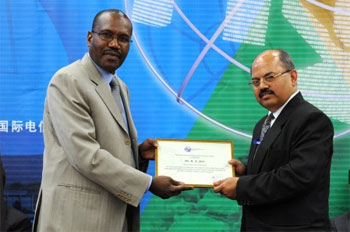 In his
closing statement
ITU Secretary-General, Dr Hamadoun I. Touré,
paid tribute to the Chairman of the 2010 session of the Council, Mr N.
Jha, Deputy Director General of India’s Department of
Telecommunications. “I am very pleased that we have managed to complete
this agenda and that we have achieved this in a cordial, friendly spirit
throughout our discussions,” Dr Touré said. “We were honoured to have
with us for this Council some ministers, deputy ministers, and
ambassadors,” he commented. The Council was attended by 330 participants
from its 46 Member States, along with 36 Member State Observers, and 4
Sector Member Observers. In his
closing statement
ITU Secretary-General, Dr Hamadoun I. Touré,
paid tribute to the Chairman of the 2010 session of the Council, Mr N.
Jha, Deputy Director General of India’s Department of
Telecommunications. “I am very pleased that we have managed to complete
this agenda and that we have achieved this in a cordial, friendly spirit
throughout our discussions,” Dr Touré said. “We were honoured to have
with us for this Council some ministers, deputy ministers, and
ambassadors,” he commented. The Council was attended by 330 participants
from its 46 Member States, along with 36 Member State Observers, and 4
Sector Member Observers.
Presenting Mr Jha with the ITU Silver Medal and certificate in
recognition of his outstanding leadership, Dr Touré said: “You have
steered our discussions with skill and ability”. All delegations, who
took the floor extended their gratitude to Mr Jha for his skills and
tact in bringing the Council to a successful conclusion on many key
issues.
Underlining some of the achievements, Dr Touré highlighted: the decision
to continue the work of the Council Working Group for the elaboration of
the draft Strategic Plan and the draft Financial Plan for 2012-2015; the
agreement to hold the World Conference on International Telecommunications in November 2012 (WCIT-12) back-to-back with
the World Telecommunication Standardization Assembly 2012 (WTSA-12);
agreement on ITU’s role in ICT and improving road safety; the
provisional approval of a cooperation agreement between ITU and CERN;
and the principles agreed upon for the future of ITU Telecom events (see
full speech). The following is a summary of the conclusions reached by
the Council on its final day.
Cooperation agreement between ITU and the European
Organization for Nuclear Research
The Council has provisionally approved a draft cooperation agreement
between ITU and the European Organization for Nuclear Research (CERN).
It has also adopted a decision to this effect (see Decision 557,
Document
C10/86 when it becomes available).
Presenting the draft agreement in
Document
C10/76, Arnaud Guillot, Head
of the Legal Affairs Unit, said that recent discussions between ITU and
CERN had resulted in a consensus on the usefulness to establish a
framework for structured relations. The provisionally approved agreement
will now be sent to the Plenipotentiary Conference for review and final
approval.
The Large Hadron Collider at CERN |
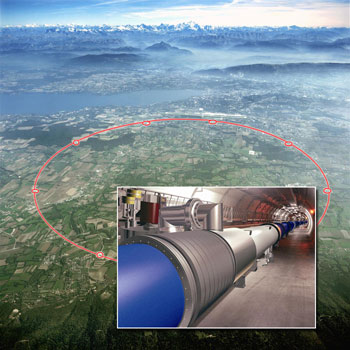 |
The agreement will constitute the legal framework within which the
two organizations will develop, on the basis of reciprocity, cooperation
in fields which are in line with their mandates. It will also ease the
carrying out of joint initiatives of mutual interest, which are expected
to cover, in the not-too-distant future, such areas as citizen
cyberscience; extension of broadband communication systems to developing
countries; training in “digital library” in these countries; and cybersecurity.
The cooperation agreement was drafted following a visit by ITU
Secretary-General Hamadoun Touré to CERN’s Director-General,
Professor Rolf Heuer in February 2010. Both ITU and CERN
secretariats then embarked on negotiations and jointly drafted a
cooperation agreement for approval by their executive bodies.
In a letter dated 9 April 2010, Professor Heuer informed Dr Touré that
the CERN Council, in its session of March 2010, authorized CERN to sign
this cooperation agreement with ITU.
Professor Heuer described these developments as a milestone in CERN's
policy to strengthen and make permanent the relations with its partner
international organizations. “ I'm very pleased that the CERN Council
also accepted my proposal to use the agreement with ITU as the model for
similar agreements with other international organizations, ” he stated
in his letter.
The Council congratulated the Secretary-General for this initiative,
saying that there are clear benefits for ITU to be associated with
organizations such as CERN. Some of these benefits are noted in the
draft agreement. For example, while remaining within their areas of
competence, ITU and CERN will “consider the possibility of preparing
joint studies and publications on subjects of common interest”.
In addition, ITU and CERN “shall provide each other with information
about the conferences, assemblies, meetings, symposia, forums, seminars
and other workshops they are called upon to organize in fields of mutual
interests. Subject to the relevant provisions of their respective rules,
they shall invite each other to attend these events under conditions to
be agreed upon in advance”. The Council noted that Member States also
see the opportunities for their own participation in the activities of
CERN.
In terms of funding, the draft agreement says that “appropriate sources
of financing shall be sought by the Parties for those of the activities
covered by the provisions of this agreement which they agree to carry
out jointly in accordance with agreed plans and schedules drawn up for
each activity; it is understood between them that no such activity shall
be implemented until it has been fully funded”. In the case of ITU, all
matters of budget and financing of activities will be reviewed by the
Council.
Shaping the future of ITU Telecom events
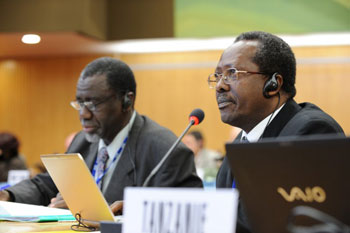 Following up on the discussion in Plenary on 19 April (see Issue No. 3 of the
Highlights), the Council examined proposed amendments to Resolution 11 (Rev.
Antalya, 2006). A drafting group had been set up on 19 April under the
chairmanship of Goodluck Ole-Medeye of Tanzania to review the proposed
amendments contained in Annex A to Document C10/66. Following up on the discussion in Plenary on 19 April (see Issue No. 3 of the
Highlights), the Council examined proposed amendments to Resolution 11 (Rev.
Antalya, 2006). A drafting group had been set up on 19 April under the
chairmanship of Goodluck Ole-Medeye of Tanzania to review the proposed
amendments contained in Annex A to Document C10/66.
Mr Ole-Medeye presented the group’s revised amendments in Document C10/DT/7,
later replaced by a revised version (Document
C10/DT/7 Rev.1). Among the proposed amendments are the deletion of the words
“and regional” throughout Resolution 11. Its title, for example, now reads
“World telecommunication/information and communication technology exhibitions
and forums”.
Another proposed change says that ITU Telecom Events would be organized on “a
predictable and regular basis”, taking due account of the need to ensure the
financial success of such events. It goes on to specify that “an ITU Telecom
Event would be held every year, ensuring that it does not overlap with any major
ITU conferences or assemblies according to the following frequency:
- A global event taking place in a fixed venue [the seat of ITU] every 2 years.
- A global event taking place in another venue in the years when the event is not held in the fixed venue.”
In both these cases, the determination of the venue would be based on a
competitive selection “focused on formally confirmed pertinent financial
commitments by the host country, thus ensuring surplus income from all ITU Telecom
Events”. Negotiations for the contract to host these events would be based on a
model host country agreement, to be approved by the Council.
Another proposed addition to Resolution 11 is “the principle of rotation between
regions, and between Member States within regions to the extent possible,
alternating yearly with the fixed location” referred to above. A transition
period is also proposed for ITU TELECOM to adapt to new market conditions. Such
a period, the proposed change says, would start in 2012 and be completed by the
end of 2014, at the latest.
Many countries requested the floor, but with several items still on the agenda,
Chairman Jha stressed that “we will not take a decision on this resolution
here”. This issue, he said, will go to the Plenipotentiary Conference, where the
decision will be taken. “Our goal here is to help the Plenipotentiary Conference
in their discussion by agreeing on the overall principles,” Mr Jha explained. He
went on to say “as I understand, the principles are:
1. TELECOM events should be held annually, and be financially profitable
2. There will be a fixed location where Telecom events will be held every two years, and in keeping with the principle of geographic rotation at an alternate location every two years, through a competitive bidding process
3. The secretariat will develop a model host country agreement to be approved by the Council.”
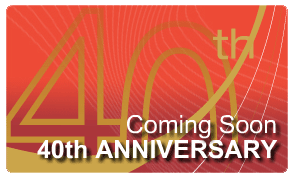 These principles, Mr Jha added, will be reflected in the summary record. At the
same time, “we also understand that we cannot afford to lose time in planning
our Telecom activities,” Mr Jha commented. “Therefore, in the meantime, the
Secretary-General should be authorized to move forward on the basis of these
principles,” Mr Jha stated. He then expressed gratitude to the Chairman of the
drafting group and to all those who contributed to “this important discussion on
the future of Telecom events”. These principles, Mr Jha added, will be reflected in the summary record. At the
same time, “we also understand that we cannot afford to lose time in planning
our Telecom activities,” Mr Jha commented. “Therefore, in the meantime, the
Secretary-General should be authorized to move forward on the basis of these
principles,” Mr Jha stated. He then expressed gratitude to the Chairman of the
drafting group and to all those who contributed to “this important discussion on
the future of Telecom events”.
Conclusion
The Council noted the proposed amendments to Resolution 11 (see Document C10/DT/7 Rev.1)). It agreed on the three principles outlined by the
Chairman. It also noted that in planning ITU Telecom events,
the Secretary-General and the Directors of the Bureaux should give due
consideration to possible synergies with other major ITU and non-ITU
global, regional and national conferences and meetings. The proposed
amendments to Resolution 11 will be transmitted to the Plenipotentiary
Conference in Guadalajara for a decision.
ITU’s role in ICT and improving road safety
The Council approved a resolution on ITU’s role in ICT and improving
road safety, originally contributed by the United States and discussed
in Plenary on 21 April (see Issue No. 6 of the Highlights). This new
resolution was presented in Plenary on 22 April as
Document
C10/63 (Rev.1). Now renumbered as Resolution 1318 C10/87, it highlights
recent developments to improve road safety around the world. It takes
into account Resolution A/RES/64/255 adopted in March 2010 by the United
Nations General Assembly on improving global road safety. The Assembly
proclaimed the period 2011-2020 as the “Decade of Action for Road
Safety”. It also notes that the United Nations, in collaboration with
the World Health Organization (WHO), has previously established the
“United Nations Road Safety Collaboration” (UNRSC) to address the
ever-growing number of road traffic deaths and injuries around the
world.
Another development cited in the new resolution is that the UN
Secretary-General has issued a UNRSC report on “Improving global road
safety” (A/64/266). This report puts the number of road traffic deaths
to nearly 1.3 million and injuries to between 20 and 50 million per
year. In addition, it estimates at USD 518 billion the global
economic loss suffered by governments and individuals from those
injuries. UNRSC is now developing a draft action plan for the decade.
The plan addresses road safety management, road-user behaviour and road-safety education. Driver distraction and road-user behaviour include “texting”, “text messaging”
and interfacing with
in-vehicle navigation or communication systems. These are cited among
the leading contributors to road traffic fatalities and injuries.
The new resolution also says that the proliferation of integrated
in-vehicle ICT and nomadic devices (including navigational information
and electronic data communication devices) may contribute to driver
distraction. But it also notes that other ICT, including intelligent transport
systems (ITS), provide mechanisms for vehicular and passenger safety. It
recognizes that these technologies have been the subject of ITU’s workshop
known as the “Fully Networked Car @ Geneva International Motor Show”. In
addition, ITU has on-going work in its Sectors, including the ITU-T
Focus Group on Car Communications (FG CarCom), which has been identified
as an appropriate place to address driver distraction. Finally, the
resolution recognizes that the successful implementation of this task,
including the development of an in-vehicle architecture and Vehicle
Gateway Platform (VGP), requires cross-sectoral collaboration within ITU
and among the World Standards Cooperation (WSC) partners.
As stipulated in the new resolution, the theme of “driver distraction”
will be included among the themes to be addressed at the WSIS Forum
2011. It will also be considered as a theme for the “2012 World
Telecommunication and Information Society Day”. All ITU Member States are
invited to take practical steps to promote national and domestic
policies, programmes and/or educational initiatives to increase
awareness of the safety risks associated with unreasonable use of ICT
and driver distraction. At the same time, they should promote the
benefits of ICT and vehicular safety technologies to help
improve global road safety. The Council also instructs the Director of TSB
to bring the new Resolution 1318 C10/87 to the attention of relevant
groups in ITU-T, in particular ITU-T Study Group 12 and its Focus Group
on Car Communication.
Membership issues
The Council reviewed and adopted proposals in Documents
C10/37,
C10/38 and
C10/39 Rev.1. It also confirmed the measures taken by the Secretary-General
regarding the admission of three "other entities" as Sector Members in
ITU-D. It granted exemptions of financial contributions to five
organizations of an international character, which will participate as
Sector Members in ITU-T and ITU-D. In addition, the Council decided that
all exemptions granted to date by the various sessions of the Council
should be submitted to the Plenipotentiary Conference in Guadalajara, in
accordance with the procedure adopted by its session in 2000. The
Secretary-General stressed the importance of exploring new ways of
attracting membership to broaden and strengthen the Union. He requested
that the Council make proposals on this issue and submit them for
discussion at PP-10.
Obsolete resolutions and decisions of the Council
At each ordinary session of the Council, a list of Resolutions and
Decisions that are obsolete are presented for review and abrogation. The
Council approved the list of Resolutions and Decisions contained in
Document C10/11. These have now been abrogated and will thus be removed
from the Volume of Council Resolutions and Decisions. The document was
presented by Marie-Odile Beau, Head of the Membership Division.
Activities of the Union for the period 2007-2010 (Part 4 of
Document C10/35)
During the Plenary on 22 April, the Council was requested to approve
Part 4 of its report on the activities of the Union for 2007-2010
contained in
Document C10/35. As reported in
Issue No. 1 of the
Highlights, the Council had considered this document, presented by
Deputy Secretary-General Houlin Zhao. The Council had approved Parts 1,
2 and 3, subject to revision as appropriate in the light of further
deliberations during this session, as well as likely additional input
from some of its working groups that were still to meet in June 2010. In
addition, the Council had agreed to note Part 5 of the report,
requesting that this be published as a separate document for Council
2010. Recalling this chain of events, Mr Zhao requested that the
Council now approve its full report. It was so agreed and the Chairman
of the Council was tasked to finalize Document C10/35, with the
assistance of the secretariat, in accordance with past practice.
Dates and agenda for the World Conference on
International Telecommunications in 2012
As reported in Issue No.5 of the Highlights,
the Council had set up a drafting group to prepare a resolution
fixing the dates and agenda for the World Conference on International
Telecommunications in 2012 (WCIT-12). The group was chaired by
Dr
Alexander Kushtuev, who is also Chairman of the Council Working Group on
WCIT-12. Dr Kushtuev presented the draft resolution in Document C10/DT/6
(later revised as Document
C10/DT/6(Rev.1)). Following some discussion and revisions of the
text, the Council approved an amended resolution fixing the
dates and agenda for this conference. It says that in line with
Resolution 146 (Antalya, 2006), WCIT-12 will be held in Geneva in the
period 5-30 November 2012, following the World Telecommunication
Standardization Assembly. This Resolution will be renumbered as
Resolution 1317 C10/84).
Submission of documents to Council
The Council has decided that all contributions to its sessions should be submitted no
later than twenty one calendar days before the opening of a
session. The decision was taken following presentation of
Document DT/5 from the drafting group chaired by Canada’s Bruce Gracie
(see Issue No.
3 of the Highlights). This decision will be published as Decision 556
(Document C10/85).
Meet the laureates of the 2010 ITU World Telecommunication and
Information Society Award
In his closing statement to the Council, Dr Touré announced three
eminent winners of the 2010 ITU World Telecommunication and Information
Society Award.
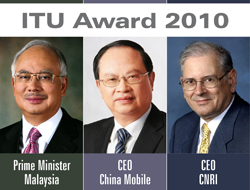 Malaysia’s Prime Minister Dato’ Sri Mohd Najib bin Tun
Abdul Razak was recognized for making connectivity one of his
priorities. In particular, he has made strengthening ICT
infrastructure a top priority. His administration is contributing to
making cyberspace a safer place for users everywhere. It is supporting
ITU’s work in strengthening global cybersecurity through the IMPACT
Centre in Cyberjaya. Malaysia’s Prime Minister Dato’ Sri Mohd Najib bin Tun
Abdul Razak was recognized for making connectivity one of his
priorities. In particular, he has made strengthening ICT
infrastructure a top priority. His administration is contributing to
making cyberspace a safer place for users everywhere. It is supporting
ITU’s work in strengthening global cybersecurity through the IMPACT
Centre in Cyberjaya.
China Mobile’s Executive Director, Chairman and CEO, Wang Jianzhou, is
connecting the world via mobile phones. Mr Wang runs a company that
operates the world’s largest mobile network, with over 500 million
subscribers today. The China Mobile network covers all major cities in China,
as well as rural and remote areas.
Dr Robert Kahn, President and CEO of the Corporation for National
Research Initiatives (CNRI), “played a key pioneering role in the
development of the Internet. He laid the foundations of the TCP/IP
protocol architecture, which is a standard operating feature of the
Internet. CNRI is a non-profit organization that focuses on the
strategic development of network-based information technologies and Kahn
has continued to nurture the evolution of the Internet, steering the
development of new standards,” as announced in the
Press release of 23
April 2010.
The three laureates will be honoured during a global ceremony, to be
organized in conjunction with World Expo 2010 in Shanghai to mark the
145th anniversary of ITU (see Issue No. 6 of the Highlights).
* The Standing Committee on Administration and Management (ADM) held 6
meetings and the conclusions of its work, along with a set of
recommendations, were presented by its Chairman Reynaldo C. González
Bustamante to the Plenary on 22 April. These conclusions will
be brought to you under separate cover.
|
 Following up on the discussion in Plenary on 19 April (see Issue No. 3 of the
Highlights), the Council examined proposed amendments to Resolution 11 (Rev.
Antalya, 2006). A drafting group had been set up on 19 April under the
chairmanship of Goodluck Ole-Medeye of Tanzania to review the proposed
amendments contained in Annex A to Document C10/66.
Following up on the discussion in Plenary on 19 April (see Issue No. 3 of the
Highlights), the Council examined proposed amendments to Resolution 11 (Rev.
Antalya, 2006). A drafting group had been set up on 19 April under the
chairmanship of Goodluck Ole-Medeye of Tanzania to review the proposed
amendments contained in Annex A to Document C10/66. These principles, Mr Jha added, will be reflected in the summary record. At the
same time, “we also understand that we cannot afford to lose time in planning
our Telecom activities,” Mr Jha commented. “Therefore, in the meantime, the
Secretary-General should be authorized to move forward on the basis of these
principles,” Mr Jha stated. He then expressed gratitude to the Chairman of the
drafting group and to all those who contributed to “this important discussion on
the future of Telecom events”.
These principles, Mr Jha added, will be reflected in the summary record. At the
same time, “we also understand that we cannot afford to lose time in planning
our Telecom activities,” Mr Jha commented. “Therefore, in the meantime, the
Secretary-General should be authorized to move forward on the basis of these
principles,” Mr Jha stated. He then expressed gratitude to the Chairman of the
drafting group and to all those who contributed to “this important discussion on
the future of Telecom events”.


